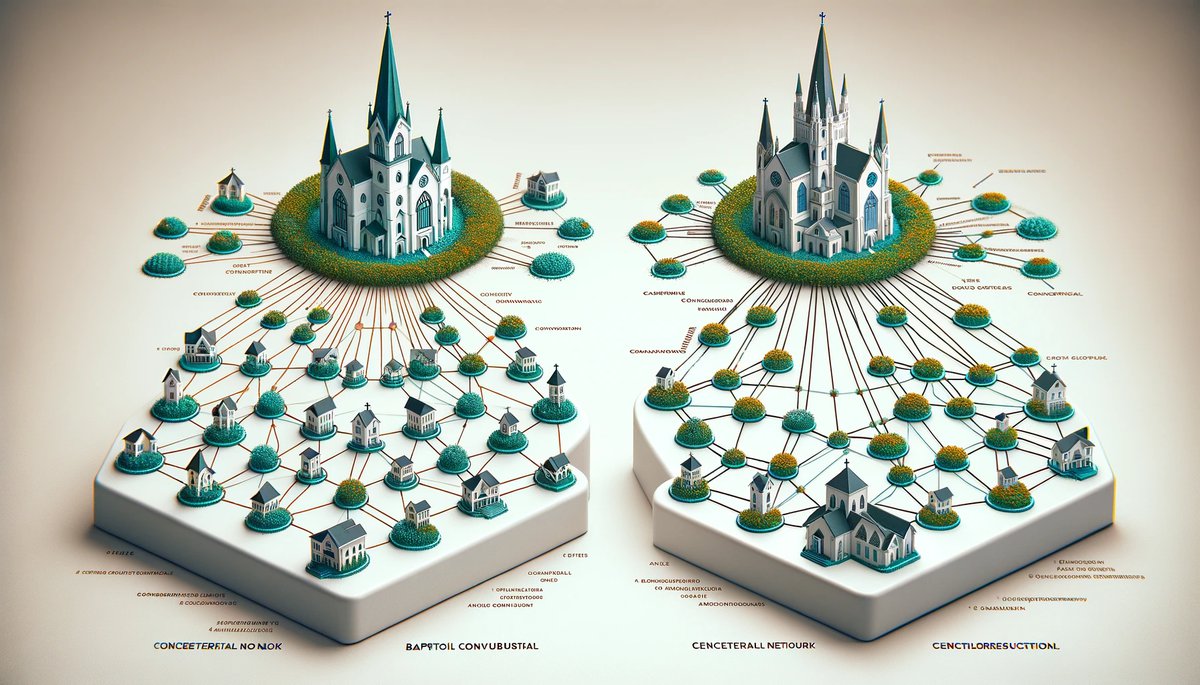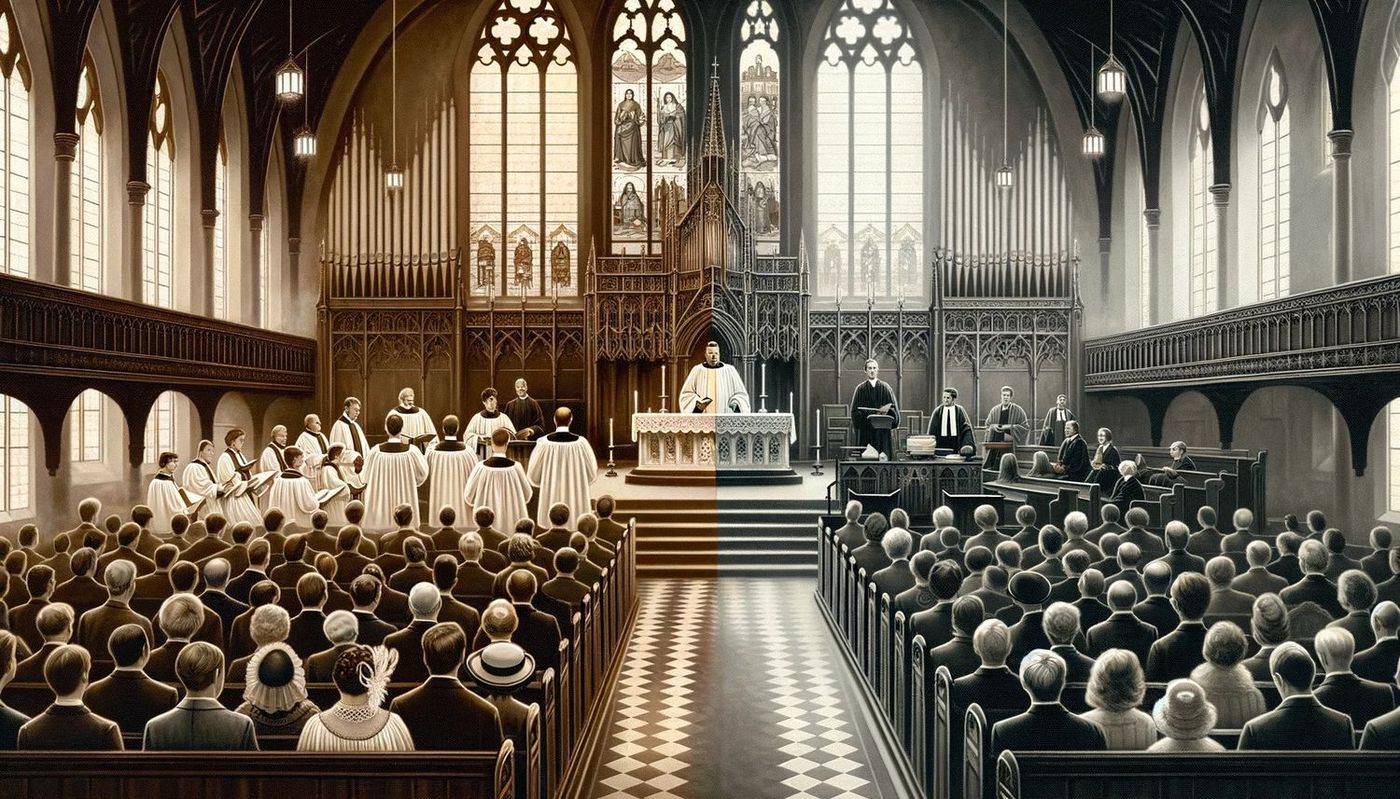Home>Theology and Spirituality>What Is The Difference Between Baptist And Church Of God


Theology and Spirituality
What Is The Difference Between Baptist And Church Of God
Published: February 21, 2024
Peter Smith, Editorial Director at Christian.net, combines deep insights into faith, politics, and culture to lead content creation that resonates widely. Awarded for his contributions to religious discourse, he previously headed a major organization for religious communicators, enhancing dialogue on faith's societal impacts.
Discover the key distinctions between Baptist and Church of God denominations in terms of theology and spirituality. Explore their beliefs and practices.
(Many of the links in this article redirect to a specific reviewed product. Your purchase of these products through affiliate links helps to generate commission for Christian.net, at no extra cost. Learn more)
Table of Contents
Introduction
The Baptist denomination and the Church of God are two prominent Christian faith traditions, each with its own distinct beliefs, practices, and organizational structures. While both groups share a foundation in the Christian faith, they differ in various theological interpretations, worship styles, and ecclesiastical governance. Understanding the differences between these two denominations can provide valuable insights into the diverse tapestry of Christian beliefs and traditions.
In this article, we will delve into the core tenets and practices of both the Baptist denomination and the Church of God, exploring their theological perspectives, worship rituals, sacramental beliefs, and leadership structures. By examining these aspects, we can gain a deeper appreciation for the rich diversity within Christianity and the ways in which different communities of faith express their devotion to God.
Through this exploration, we aim to shed light on the nuanced distinctions between Baptists and the Church of God, offering readers a comprehensive understanding of how these two Christian traditions diverge in their interpretations of scripture, modes of worship, and organizational frameworks. By delving into the unique characteristics of each denomination, we can foster a greater spirit of interdenominational understanding and appreciation for the multifaceted tapestry of Christian faith expressions.
As we embark on this journey of discovery, we invite you to open your hearts and minds to the rich tapestry of Christian traditions, recognizing the beauty in the diverse ways in which believers seek to honor and serve the Lord. Let us embark on this enlightening exploration of the differences between Baptists and the Church of God, embracing the opportunity to deepen our understanding of the multifaceted landscape of Christian faith.
Beliefs and Practices of Baptists
Baptists are a group of Christians known for their adherence to believer's baptism, which is the practice of baptizing only those who are able to make a personal profession of faith in Jesus Christ. This emphasis on believer's baptism is rooted in the Baptist belief in the autonomy of the local church and the priesthood of all believers. In Baptist theology, each individual has the freedom to approach God directly without the need for an intermediary, reflecting a deep commitment to personal faith and individual spiritual responsibility.
The Baptist tradition places a strong emphasis on the authority of Scripture, viewing the Bible as the ultimate source of divine revelation and guidance for faith and practice. This commitment to biblical authority is reflected in the preaching and teaching within Baptist congregations, where the exposition of scripture holds a central place in worship services and spiritual instruction.
In terms of governance, Baptists typically adhere to a congregational polity, wherein each local church is autonomous and self-governing. This means that decisions regarding church leadership, doctrinal beliefs, and matters of church discipline are made by the congregation itself, often through a process of democratic decision-making. This congregational autonomy allows for a high degree of flexibility and adaptability within Baptist churches, enabling them to respond to the specific needs and contexts of their congregations.
Worship practices among Baptists vary widely, encompassing a range of musical styles, liturgical expressions, and approaches to corporate worship. While some Baptist churches may embrace a more traditional form of worship, characterized by hymn singing and structured liturgy, others may adopt a contemporary worship style, incorporating modern music and informal elements into their services. This diversity in worship reflects the Baptist commitment to freedom of conscience and the recognition of individual congregational preferences.
In summary, the beliefs and practices of Baptists are characterized by a strong emphasis on believer's baptism, the authority of Scripture, congregational autonomy, and a diverse approach to worship. These foundational elements shape the identity and expression of Baptist faith communities, fostering a rich tapestry of theological perspectives and worship traditions within the broader landscape of Christian faith.
Beliefs and Practices of Church of God
The Church of God, a distinct Christian denomination, holds a set of beliefs and practices that distinguish it within the broader Christian landscape. Central to the faith of the Church of God is the belief in the triune nature of God, acknowledging the Father, Son, and Holy Spirit as three distinct persons in one divine essence. This Trinitarian belief forms the foundational framework for the Church of God's theological understanding and shapes its worship and spiritual practices.
The Church of God places a strong emphasis on the spiritual gifts outlined in the New Testament, particularly the gifts of the Holy Spirit as described in the book of 1 Corinthians. This emphasis on spiritual gifts leads to a vibrant expression of worship and ministry within Church of God congregations, where the operation of spiritual gifts such as prophecy, speaking in tongues, and healing is embraced as integral to the life of the church.
In terms of sacramental practices, the Church of God upholds the significance of baptism and the Lord's Supper as essential components of Christian faith and discipleship. Baptism is viewed as a symbolic act of identification with the death, burial, and resurrection of Jesus Christ, signifying the believer's commitment to a new life in Christ. The Lord's Supper, or communion, is celebrated as a remembrance of Christ's sacrificial death and a symbol of the ongoing spiritual nourishment provided to believers through their union with Christ.
The Church of God also places a strong emphasis on the priesthood of all believers, affirming the role of every individual believer as a minister of the gospel and a participant in the mission of the church. This egalitarian view of ministry encourages active involvement and service from all members of the congregation, fostering a sense of shared responsibility and mutual edification within the body of Christ.
In summary, the beliefs and practices of the Church of God are characterized by a Trinitarian theology, a vibrant expression of spiritual gifts, a sacramental understanding of baptism and communion, and a commitment to the priesthood of all believers. These foundational elements shape the identity and expression of Church of God faith communities, fostering a dynamic and participatory approach to worship, ministry, and spiritual life.
Differences in Worship and Sacraments
The differences in worship and sacramental practices between the Baptist denomination and the Church of God reflect distinct theological emphases and spiritual expressions within these Christian traditions. In the realm of worship, Baptists exhibit a wide spectrum of styles, ranging from traditional hymn-based services to contemporary expressions, reflecting the autonomy and diversity inherent in Baptist congregations. This flexibility allows individual churches to tailor their worship experiences to the preferences and cultural contexts of their members, fostering a sense of inclusivity and relevance in their worship practices.
On the other hand, the Church of God embraces a dynamic and participatory approach to worship, characterized by a vibrant expression of spiritual gifts as outlined in the New Testament. This includes the operation of gifts such as prophecy, speaking in tongues, and healing, which are viewed as integral to the worship and ministry of the church. The emphasis on spiritual gifts infuses Church of God worship services with a sense of immediacy and spiritual fervor, creating an atmosphere of active engagement and divine encounter.
In terms of sacramental beliefs, both denominations hold baptism in high regard, albeit with differing theological underpinnings. Baptists emphasize believer's baptism, viewing it as a public declaration of an individual's personal faith in Jesus Christ and a symbolic act of identification with Christ's death and resurrection. This emphasis on believer's baptism underscores the Baptist commitment to the autonomy of the local church and the priesthood of all believers, highlighting the personal and voluntary nature of faith commitment.
In contrast, the Church of God also upholds the significance of baptism as a symbolic act of identification with Christ, but places additional emphasis on the operation of spiritual gifts and the experiential dimension of baptism as a transformative encounter with the Holy Spirit. This sacramental emphasis reflects the Church of God's belief in the ongoing work of the Holy Spirit in the life of the believer, shaping their understanding of baptism as a spiritually enriching and empowering experience.
In summary, the differences in worship and sacraments between Baptists and the Church of God underscore the diverse theological perspectives and spiritual expressions within these Christian traditions. While Baptists exhibit a broad spectrum of worship styles and emphasize believer's baptism, the Church of God embraces a dynamic and participatory worship ethos, coupled with a sacramental emphasis on the transformative encounter with the Holy Spirit in baptism. These differences enrich the tapestry of Christian worship and sacramental practices, reflecting the multifaceted nature of faith expression within the body of Christ.
Leadership and Governance
The Baptist denomination and the Church of God diverge in their approaches to leadership and governance, reflecting distinct organizational structures and ecclesiastical frameworks. Within the Baptist tradition, congregational autonomy is a defining feature of governance, wherein each local church operates independently and makes decisions through a democratic process involving the congregation. This emphasis on local autonomy empowers individual churches to govern themselves, select their leaders, and determine their doctrinal beliefs without external hierarchical control. The Baptist polity affirms the priesthood of all believers, granting each member a voice in the decision-making processes and fostering a sense of communal responsibility for the life and direction of the church.
In contrast, the Church of God follows a hierarchical model of governance, characterized by a centralized leadership structure that extends beyond the local congregation. This hierarchical framework often includes regional and national levels of leadership, with appointed or elected officials providing oversight and guidance to individual churches. The Church of God's governance model emphasizes accountability, unity, and adherence to established doctrinal standards, seeking to maintain doctrinal and organizational coherence across its affiliated congregations. This centralized approach to leadership reflects the Church of God's commitment to fostering a sense of interconnectedness and shared identity among its member churches, promoting a unified vision and mission within the denomination.
Furthermore, the Baptist tradition typically practices congregational polity, wherein the congregation holds the ultimate authority in matters of leadership selection, doctrinal interpretation, and church discipline. This democratic approach to governance reflects the Baptist commitment to individual autonomy and the belief that each local church has the freedom to discern and follow God's leading within its specific context. The congregation often plays a direct role in the selection and affirmation of church leaders, including pastors, elders, and deacons, through a process of prayerful discernment and consensus-building.
On the other hand, the Church of God's leadership and governance structure often involves the appointment or election of leaders at various levels of the denomination, including regional and national leadership positions. This hierarchical model allows for centralized decision-making, strategic coordination of ministry initiatives, and the implementation of doctrinal oversight across affiliated churches. The leadership positions within the Church of God are typically filled through a combination of nomination, vetting, and approval processes, with a focus on maintaining doctrinal fidelity and organizational unity.
In summary, the differences in leadership and governance between the Baptist denomination and the Church of God reflect distinct approaches to organizational structure, decision-making processes, and ecclesiastical authority. While Baptists prioritize congregational autonomy and the priesthood of all believers, the Church of God embraces a hierarchical model that emphasizes centralized leadership and doctrinal coherence across its affiliated congregations. These divergent governance models contribute to the unique identity and operational dynamics of each denomination, shaping the ways in which they fulfill their mission and ministry within the broader landscape of Christian faith.
Conclusion
In conclusion, the exploration of the differences between the Baptist denomination and the Church of God reveals a rich tapestry of theological perspectives, worship practices, sacramental beliefs, and leadership structures within the Christian faith. While both traditions share a foundational commitment to the Christian gospel and the authority of Scripture, they diverge in their interpretations and expressions of faith, reflecting the diverse ways in which believers seek to honor and serve the Lord.
The beliefs and practices of Baptists are characterized by a strong emphasis on believer's baptism, the authority of Scripture, congregational autonomy, and a diverse approach to worship. This emphasis on individual faith commitment, congregational autonomy, and diverse worship styles underscores the Baptist commitment to personal spiritual responsibility and the freedom of conscience within the local church.
On the other hand, the Church of God embraces a Trinitarian theology, a vibrant expression of spiritual gifts, a sacramental understanding of baptism and communion, and a commitment to the priesthood of all believers. These foundational elements shape the identity and expression of Church of God faith communities, fostering a dynamic and participatory approach to worship, ministry, and spiritual life.
Furthermore, the differences in worship and sacraments between Baptists and the Church of God underscore the diverse theological perspectives and spiritual expressions within these Christian traditions. While Baptists exhibit a broad spectrum of worship styles and emphasize believer's baptism, the Church of God embraces a dynamic and participatory worship ethos, coupled with a sacramental emphasis on the transformative encounter with the Holy Spirit in baptism. These differences enrich the tapestry of Christian worship and sacramental practices, reflecting the multifaceted nature of faith expression within the body of Christ.
Moreover, the differences in leadership and governance between the Baptist denomination and the Church of God reflect distinct approaches to organizational structure, decision-making processes, and ecclesiastical authority. While Baptists prioritize congregational autonomy and the priesthood of all believers, the Church of God embraces a hierarchical model that emphasizes centralized leadership and doctrinal coherence across its affiliated congregations. These divergent governance models contribute to the unique identity and operational dynamics of each denomination, shaping the ways in which they fulfill their mission and ministry within the broader landscape of Christian faith.
In essence, the differences between Baptists and the Church of God serve as a testament to the rich diversity of Christian beliefs and practices, highlighting the multifaceted ways in which believers seek to express their devotion to God and live out their faith. By embracing these differences with understanding and respect, we can cultivate a spirit of unity within the body of Christ, recognizing the beauty in the varied expressions of Christian faith and the shared commitment to proclaiming the gospel and serving the world in Jesus' name.














